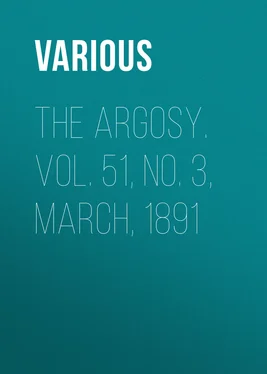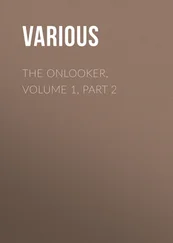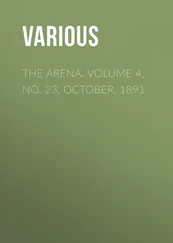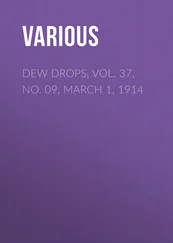Various - The Argosy. Vol. 51, No. 3, March, 1891
Здесь есть возможность читать онлайн «Various - The Argosy. Vol. 51, No. 3, March, 1891» — ознакомительный отрывок электронной книги совершенно бесплатно, а после прочтения отрывка купить полную версию. В некоторых случаях можно слушать аудио, скачать через торрент в формате fb2 и присутствует краткое содержание. Жанр: foreign_antique, periodic, foreign_edu, на английском языке. Описание произведения, (предисловие) а так же отзывы посетителей доступны на портале библиотеки ЛибКат.
- Название:The Argosy. Vol. 51, No. 3, March, 1891
- Автор:
- Жанр:
- Год:неизвестен
- ISBN:нет данных
- Рейтинг книги:4 / 5. Голосов: 1
-
Избранное:Добавить в избранное
- Отзывы:
-
Ваша оценка:
- 80
- 1
- 2
- 3
- 4
- 5
The Argosy. Vol. 51, No. 3, March, 1891: краткое содержание, описание и аннотация
Предлагаем к чтению аннотацию, описание, краткое содержание или предисловие (зависит от того, что написал сам автор книги «The Argosy. Vol. 51, No. 3, March, 1891»). Если вы не нашли необходимую информацию о книге — напишите в комментариях, мы постараемся отыскать её.
The Argosy. Vol. 51, No. 3, March, 1891 — читать онлайн ознакомительный отрывок
Ниже представлен текст книги, разбитый по страницам. Система сохранения места последней прочитанной страницы, позволяет с удобством читать онлайн бесплатно книгу «The Argosy. Vol. 51, No. 3, March, 1891», без необходимости каждый раз заново искать на чём Вы остановились. Поставьте закладку, и сможете в любой момент перейти на страницу, на которой закончили чтение.
Интервал:
Закладка:
Various
The Argosy / Vol. 51, No. 3, March, 1891
THE FATE OF THE HARA DIAMOND
CHAPTER IX
Captain Edmund Ducie was one of the first to emerge from the wreck. He crept out of the broken window of the crushed-up carriage, and shook himself as a dog might have done. "Once more a narrow squeak for life," he said, half aloud. "If I had been worth ten thousand a-year, I should infallibly have been smashed. Not being worth ten brass farthings, here I am. What has become of my little Russian, I wonder?"
No groan or cry emanated from that portion of the broken carriage out of which Captain Ducie had just crept. Could it be possible that Platzoff was killed?
With considerable difficulty Ducie managed to wrench open the smashed door. Then he called the Russian by name; but there was no answer. He could discern nothing inside save a confused heap of rugs and minor articles of luggage. Under these, enough in themselves to smother him, Platzoff must be lying. One by one these articles were fished out of the carriage, and thrown aside by Ducie. Last of all he came to Platzoff, lying in a heap, white and insensible, as one already dead.
Putting forth all his great strength, Ducie lifted the senseless body out of the carriage as carefully and tenderly as though it were that of a new-born child. He then saw that the Russian was bleeding from an ugly jagged wound at the back of his head. There was no trace of any other outward hurt. A faint pulsation of the heart told that he was still alive.
On looking round, Ducie saw that there was a large country tavern only a few hundred yards from the scene of the accident. Towards this house, which announced itself to the world under the title of "The Golden Griffin," he now hastened with long measured strides, carrying the still insensible Russian in his arms. In all, some half-dozen carriages had come over the embankment. The shrieks and cries of the wounded passengers were something appalling. Already the passengers in the fore part of the train, who had escaped unhurt, together with the officials and a few villagers who happened to be on the spot, were doing their best to rescue these unfortunates from the terrible wreckage in which they were entangled.
Captain Ducie was the first man from the accident to cross the threshold of "The Golden Griffin." He demanded to be shown the best spare room in the house. On the bed in this room he laid the body of the still insensible Platzoff. His next act was to despatch a mounted messenger for the nearest doctor. Then, having secured the services of a brisk, steady-nerved chambermaid, he proceeded to dress the wound as well as the means at his command would allow of—washing it, and cutting away the hair, and, by means of some ice, which he was fortunate enough to procure, succeeding in all but stopping the bleeding, which, to a man so frail of body, so reduced in strength as Platzoff, would soon have been fatal. A teaspoonful of brandy administered at brief intervals did its part as a restorative, and some minutes before the doctor's arrival Ducie had the satisfaction of seeing his patient's eyes open, and of hearing him murmur faintly a few soft guttural words in some language which the Captain judged to be his native Russ.
Platzoff had quite recovered his senses by the time the doctor arrived, but was still too feeble to do more than whisper a few unconnected words. There were many claimants this forenoon on the doctor's attention, and the services required by Platzoff at his hands had to be performed as expeditiously as possible.
"You must make up your mind to be a guest of 'The Golden Griffin' for at least a week to come," he said, as he took up his hat preparatory to going. "With quiet, and care, and a strict adherence to my instructions, I daresay that by the end of that time you will be sufficiently recovered to leave here for your own home. Humanly speaking, sir, you owe your life to this gentleman," indicating Ducie. "But for his skill and promptitude you would have been a dead man before I reached you."
Platzoff's thin white hand was extended feebly. Ducie took it in his sinewy palms and pressed it gently. "You have this day done for me what I can never forget," whispered the Russian, brokenly. Then he closed his eyes, and seemed to sink off into a sleep of exhaustion.
Leaving strict injunctions with the chambermaid not to quit the room till he should come back, Captain Ducie went downstairs with the intention of revisiting the scene of the disaster. He called in at the bar to obtain his favourite "thimbleful" of cognac, and there he found a very agreeable landlady, with whom he got into conversation respecting the accident. Some five minutes had passed thus when the chambermaid came up to him. "If you please, sir, the foreign gentleman has woke up, and is anxiously asking to see you."
With a shrug of the shoulders and a slight lowering of his black eyebrows, Captain Ducie went back upstairs. Platzoff's eager eyes fixed him as he entered the room. Ducie sat down close by the bed and said in a kindly tone: "What is it? What can I do for you? Command me in any way."
"My servant—where is he? And—and my despatch box. Valuable papers. Try to find it."
Ducie nodded and left the room. The inquiries he made soon elicited the fact that Platzoff's servant had been even more severely injured than his master, and was at that moment lying, more dead than alive, in a little room upstairs. Slowly and musingly, with hands in pocket, Captain Ducie then took his way towards the scene of the accident. "It may suit my book very well to make friends with this Russian," he thought as he went along. "He is no doubt very rich; and I am very poor. In us the two extremes meet and form the perfect whole. He might serve my purposes in more ways than one, and it is just as likely that his purposes might be served by me: for a man like that must have purposes that want serving. Nous verrons. Meanwhile, I am his obedient servant to command."
Captain Ducie, hunting about among the débris of the train, was not long in finding the fragments of M. Platzoff's despatch box. Its contents were scattered about. Ducie spent ten minutes in gathering together the various letters and documents which it had contained. Then, with the broken box under his arm and the papers in his hands, he went back to the Russian.
He showed the papers one by one to Platzoff, who was strangely eager in the matter. When Ducie held up the last of them, Platzoff groaned and shut his eyes. "They are all there as far as I can judge," he murmured, "except the most important one of all—a paper covered with figures, of no use to anyone but myself. Oh, dear Captain Ducie! do please go once more and try to find the one that is still missing. If I only knew that it was burnt, or torn into fragments, I should not mind so much. But if it were to fall into the hands of a scoundrel skilful enough to master the secret which it contains, then I—"
He stopped with a scared look on his face, as though he had unwittingly said more than he had intended.
"Pray don't trouble yourself with any explanations just now," said Ducie. "You want the paper: that is enough. I will go and have a thorough hunt for it."
Back went Ducie to the broken carriages and began to search more carefully than before. "What can be the nature of the great secret, I wonder, that is hidden between the Sibylline leaves I am in search of? If what Platzoff's words implied be true, he who learns it is master of the situation. Would that it were known to me!"
Slowly and carefully, inside and out of the carriage in which he and Platzoff had travelled, Captain Ducie conducted his search. One by one he again turned over the wraps and different articles of personal luggage belonging to both of them, which had not yet been removed. The first object that rewarded his search was a splendid diamond pin which he remembered having seen in Platzoff's scarf. Ducie picked it up and looked cautiously around. No one was regarding him. "Of the first water and worth a hundred guineas at the very least," he muttered. Then he put it in his waistcoat pocket and went on with his search.
Читать дальшеИнтервал:
Закладка:
Похожие книги на «The Argosy. Vol. 51, No. 3, March, 1891»
Представляем Вашему вниманию похожие книги на «The Argosy. Vol. 51, No. 3, March, 1891» списком для выбора. Мы отобрали схожую по названию и смыслу литературу в надежде предоставить читателям больше вариантов отыскать новые, интересные, ещё непрочитанные произведения.
Обсуждение, отзывы о книге «The Argosy. Vol. 51, No. 3, March, 1891» и просто собственные мнения читателей. Оставьте ваши комментарии, напишите, что Вы думаете о произведении, его смысле или главных героях. Укажите что конкретно понравилось, а что нет, и почему Вы так считаете.












